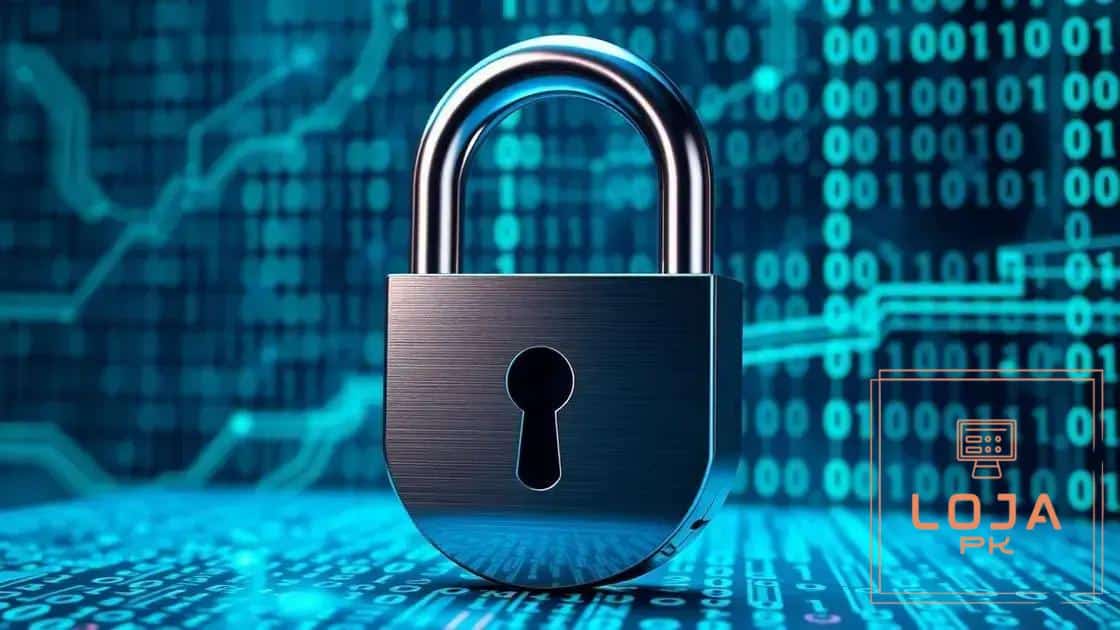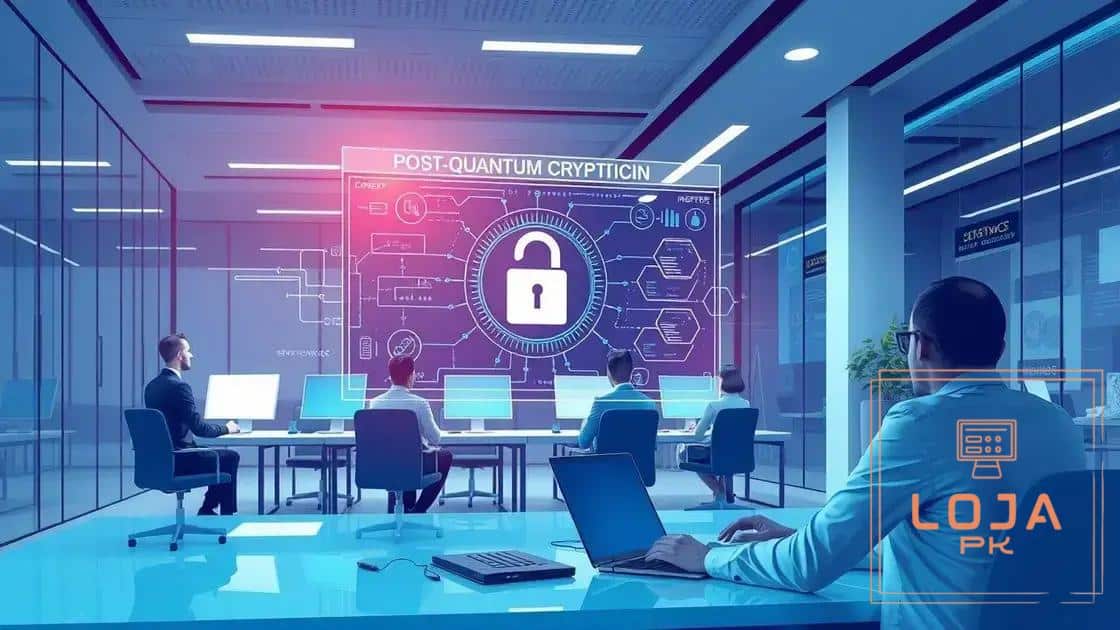Post-quantum cryptography becomes corporate standard

Post-quantum cryptography is essential for securing data against quantum threats, employing algorithms designed to withstand potential attacks from advanced quantum computing technologies.
Post-quantum cryptography becomes corporate standard as organizations recognize the urgent need for robust security measures. Are you prepared for the next wave of encryption?
Understanding post-quantum cryptography
Understanding post-quantum cryptography is crucial in today’s ever-evolving digital landscape. As quantum computing technology advances, traditional encryption methods may become obsolete. This means organizations must adapt and embrace new methods to protect sensitive information.
Post-quantum cryptography aims to develop encryption algorithms that can withstand attacks from quantum computers. By using mathematical structures that quantum computers cannot easily solve, this new cryptography seeks to safeguard data against future threats.
Key Features of Post-Quantum Cryptography
Post-quantum cryptography involves several unique characteristics:
- Resistance to quantum attacks: The algorithms are designed to be secure against powerful quantum systems.
- Diverse algorithm types: Various approaches are being researched, including lattice-based, hash-based, and multivariate polynomial cryptography.
- Compatibility: New systems should work alongside existing protocols to ensure a smooth transition.
As organizations begin to implement post-quantum cryptography, understanding its principles will become vital. These new methods not only provide security, but they also foster trust in digital communications. Moreover, awareness of these technologies can encourage proactive measures against potential vulnerabilities.
Future-proofing data security requires exploring and adopting these advanced encryption methods. As businesses navigate the challenges posed by emerging technologies, investing in post-quantum cryptography represents a crucial step towards safeguarding sensitive information.
Why companies need to adapt now

Companies must recognize the urgency to adapt to post-quantum cryptography now. As technology evolves, so do the threats to data security. With the rapid development of quantum computing, traditional encryption methods might soon be ineffective.
Failure to adapt can lead to significant consequences. The potential for data breaches increases as quantum computers become more capable of breaking current encryption systems. Organizations that do not prepare risk losing customer trust and facing financial losses.
The Risks of Inaction
Without swift action, companies expose themselves to several risks:
- Data breaches: Sensitive information may be compromised as quantum technology advances.
- Legal repercussions: Companies may face lawsuits if they fail to protect customer data adequately.
- Loss of competitive edge: Businesses that adapt will be better positioned in the market, while others struggle with outdated security.
Organizations must also understand that adopting post-quantum cryptography brings benefits beyond security. It showcases a commitment to innovation and technology that can enhance overall reputation. This adaptability can attract clients who prioritize security in their business decisions.
As leaders in their fields, companies should prioritize understanding post-quantum measures. Taking proactive steps ensures they are not left vulnerable in a rapidly changing technological landscape. The time to act is now, and embracing these solutions is crucial for staying secure.
Impact on data security and privacy
The impact of post-quantum cryptography on data security and privacy is profound and far-reaching. As quantum computers advance, traditional encryption methods will face significant challenges. By implementing new cryptographic techniques, companies can better protect sensitive information from potential threats.
One major aspect of this impact is the enhancement of data integrity. Post-quantum algorithms are designed to resist attacks that could disrupt or manipulate critical data. This means that businesses can assure clients and stakeholders that their information remains secure against emerging technologies.
Key Benefits of Post-Quantum Cryptography
Adopting post-quantum cryptography brings several key benefits for data security, including:
- Increased resilience: New algorithms are specifically built to withstand quantum hacking attempts.
- Improved privacy: Enhanced encryption methods help maintain confidentiality of personal data.
- Trust and compliance: Implementing advanced cryptography shows a commitment to security and helps meet regulatory requirements.
Moreover, the shift to post-quantum cryptography fosters a culture of security awareness within organizations. Employees become more vigilant regarding data protection, promoting best practices in handling sensitive information. As a result, businesses can significantly reduce the risk of data breaches and build stronger relationships with their customers.
Overall, the transition to post-quantum cryptography is essential in protecting data privacy and fortifying systems against future vulnerabilities. Companies that take steps to adapt will not only secure their operations but also position themselves as leaders in the digital age.
Challenges in implementing post-quantum solutions

Implementing post-quantum solutions presents unique challenges for organizations. As businesses seek to upgrade their security measures, several hurdles can arise during the transition to this new technology. Understanding these obstacles is essential for a successful implementation.
One major challenge is the complexity of post-quantum algorithms. These algorithms often require different computational resources and architectures compared to traditional methods. Some companies may struggle to adapt their existing systems and infrastructure to accommodate these new requirements.
Key Challenges to Consider
When moving toward post-quantum cryptography, businesses face specific challenges, such as:
- Integration issues: Ensuring that new algorithms work seamlessly with existing software and hardware can be difficult.
- Performance concerns: Some post-quantum algorithms may be slower or require more processing power, impacting system performance.
- Lack of expertise: There is a limited pool of professionals experienced in implementing and managing post-quantum solutions.
Moreover, organizations must be mindful of compliance regulations. Adjusting to post-quantum solutions means ensuring new security practices align with industry standards and legal requirements. Failure to do so can result in penalties and reputational damage.
Finally, the investment required can be significant. Companies may need to allocate resources for training, system upgrades, and ongoing support. This financial aspect can deter some organizations from making the necessary changes.
Despite these challenges, it is essential for businesses to prioritize post-quantum cryptography. By identifying and addressing these hurdles head-on, organizations can effectively safeguard their data against future vulnerabilities.
Future trends in corporate cybersecurity
The future trends in corporate cybersecurity are set to evolve dramatically as the digital landscape changes. One major focus will be the adoption of post-quantum cryptography, which promises to enhance security measures against the rising threat of quantum computers. This approach will ensure that sensitive data remains protected in an age where traditional encryption may no longer suffice.
Businesses will also increasingly rely on artificial intelligence (AI) and machine learning to predict and combat cyber threats. By analyzing patterns and behaviors, these technologies can help organizations identify vulnerabilities more quickly and respond to incidents more effectively.
Emerging Cybersecurity Trends to Watch
Key trends shaping the future of corporate cybersecurity include:
- Zero-trust security models: Companies will embrace zero-trust frameworks, requiring strict identity verification for every user, device, and connection.
- Increased automation: Automated security solutions will streamline threat detection and response processes, reducing the workload on security teams.
- Focus on privacy regulations: As laws around data privacy become stricter, organizations will need to ensure compliance to avoid penalties.
Furthermore, the Internet of Things (IoT) will continue to expand, leading to new security challenges. As more devices connect to networks, ensuring their security will become a critical concern. Companies must establish robust protocols to protect their IoT devices from cyber threats.
Finally, the importance of cybersecurity training for employees cannot be overstated. As phishing attacks and social engineering tactics become more sophisticated, organizations will prioritize ongoing education to equip their staff with the skills needed to recognize and respond to potential threats.
In summary, organizations should prepare for a future where cybersecurity evolves rapidly. By staying informed about trends, investing in emerging technologies, and fostering a culture of security awareness, companies can safeguard their assets against evolving cyber threats.
The future of corporate cybersecurity is bright yet challenging. With the rapid advancement of technology, companies must prepare to implement innovative solutions like post-quantum cryptography. Understanding emerging trends such as AI, zero-trust protocols, and IoT security will be essential for organizations to protect their data effectively. Continuous employee training will also play a critical role in creating a security-aware culture. By staying informed and proactive, businesses can navigate the complexities of cybersecurity and ensure their systems remain secure against evolving threats.
FAQ – Frequently Asked Questions about Corporate Cybersecurity and Post-Quantum Cryptography
What is post-quantum cryptography?
Post-quantum cryptography consists of cryptographic algorithms designed to protect data from potential attacks by quantum computers.
Why is AI important in cybersecurity?
AI helps organizations detect and respond to cyber threats more efficiently by analyzing patterns and predicting vulnerabilities.
What is a zero-trust security model?
A zero-trust model requires verification for every user and device, eliminating the assumption that anything inside the network is safe.
How can companies ensure IoT device security?
Companies can ensure IoT security by implementing strong encryption, regular updates, and strict access controls for their devices.





